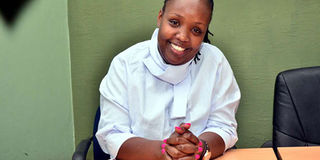I put babies to sleep for a living

Ruth Mwende talks about her company on August 27, 2019. She says she founded Momzy Network to create a network of moms who could help each other in motherhood. PHOTO | FRANCIS NDERITU | NATION MEDIA GROUP
What you need to know:
- Even the medical field does not know how sleep really works. There is a lot of mass education needed in terms of the importance of sleep.
- We map out a sleep plan with the parent to act as a reference point. I am in constant communication with the parent to be aware of the progress.
Ruth Mwende quit her job to take care of her newborn. It was this life-changing career move into sleep therapy. The chief executive officer of Momzy Network shares her story.
******
"People call me the sleep doctor, baby whisperer or paediatrician-cum-sleep consultant. I think I'll adopt the name sleep doctor soon though. (Laughs).
I'm a reader. I absorb knowledge, but never did I think that taking care of babies would be intense. This was right after giving birth to my daughter six years ago.
Mothers are wired to always anticipate the motions: colic, crying, lack of sleep and all.
When I gave birth, I only made sure that my baby ate and went back to sleep. I didn't know that this in itself was sleep training.
I didn't have a caregiver at the time, so I had to make sure I balanced everything.
SLEEP THERAPY
I needed not to lose who I was as a person, and to be a mom at the same time so that training seemed to work in my favour. My daughter is in bed by 7pm to date.
One of my friends, who had seen how well my baby slept, said that I should take that training further. I studied insurance at the university. I had quit insurance to take care of my child.
I then started reading and researching online: lactation consultants, post-partum doula — which I tried for a while but found it too intense and then finally came across articles on sleep therapy.
I couldn't believe it. I didn't sleep a wink. I finally realised how the science of sleep works, and why my child slept the way she did.
I decided to put the theory into action. I just went on social media and said, ‘Hit me up if you have a baby that does not sleep.' My inbox was on fire.
AWARENESS
For a year, I did a lot of pro bono work. The feedback was that the training worked. I knew this was what I wanted to do in the long run.
Sleep therapy is an underresearched topic in Kenya. It was the challenge I needed.
It has taken years to perfect the skill, and I can confidently say that there's no child I cannot put to sleep. It's not a fluke or luck.
Sleep and behaviour correlate. The better the baby sleeps, the better behaved they are.
It's been four years of practice. It has not been easy to convince on the importance of what I do to other moms.
Even the medical field does not know how sleep really works. There is a lot of mass education needed in terms of the importance of sleep.
It's been a challenge to beat the old school mentality. Many say, ‘The baby will eventually sleep,' or ‘why should you put in your money for that?'
But through referrals, I've converted many non-believers.
CLIENTELE
Momzy Network was born one day at midnight. I wanted to create a network of moms who could help each other in motherhood.
It's a struggle, and it takes a village. Now my phone calls start with: ‘Hi Mwende. I was referred to you by so and so.'
I have clients outside of the country with whom we mostly Skype or do WhatsApp calls. They are normally mothers who have a child that doesn't sleep, or is sleep deprived. Working middle-class moms are my biggest clients.
My work is age grouped. The earliest I take on a baby is at four weeks and the oldest is at six years. My services typically start from Sh15,000 for babies between 0-11 weeks to Sh20,000 from three months onwards.
There are children I cannot work on, and this is mostly because of existing medical conditions. Normally, a parent has to fill a sleep-declaration form before the work starts.
I take four weeks to work on a child's sleep. I have to do physical examinations on some babies, if need be, to test their colic reflux gas, especially on children between zero to 11 months old.
PROGRAMME
We map out a sleep plan with the parent to act as a reference point. I am in constant communication with the parent to be aware of the progress.
I only go back for consultation when a need arises. Otherwise, we only communicate feedback through phone calls, e-mails, text messages, and whatever works.
In the four weeks, the child should be on constant quality, quantity, and restorative sleep. Those three words just have to work hand in hand, otherwise, I would not have done my job.
I plan months so that I am fully present for one family. Sleep training is a very emotional programme. The work is not about just putting a baby to sleep; it's about empathy to the mother too.
I am now 33 and I plan to open a sleep research centre soon. I would also like to venture into adult sleep.
The best part of my job is the fulfilment that comes with a mother telling me, ‘You changed my life Mwende.' ‘You have brought peace in my family Mwende.'
‘Mwende, my marriage was falling apart before I met you.' ‘I can't believe that this child, who I was told is possessed, is now peaceful.'"





